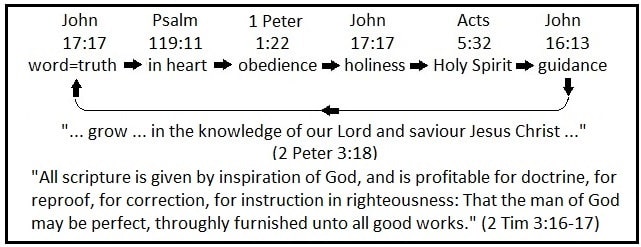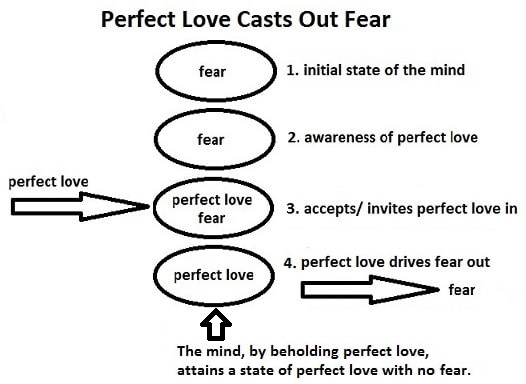Ephesians 5:26 Cleansing by the Word
(Part 18 of the Cleansing of the Sanctuary Series)
“That he might sanctify and cleanse it [the church] with the washing of water by the word,” (Ephesians 5:26)
It is interesting that the words “sanctuary” (hagion, G39) and “sanctify” (hagiazo, G37) are both from the same Greek word “hagios,” (G40) usually translated as “holy.” A sanctuary is a holy place and a place that is clean.
Cleansing is a Process
Scripture indicates that cleansing the sanctuaries, the hearts of people involves the Word of God. When we learn truth from the Word, we can choose to obey it and receive the benefits. It involves a process that might be illustrated like this:

First we learn truth (even if just a little) from the Word:
“Sanctify them through thy truth: thy word is truth.” (John 17:17)
It starts to have an effect right away. Then we remember and treasure that truth in our hearts and put value on it:
“Thy word have I hid in mine heart, that I might not sin against thee.” (Psa 119:11)
That truth, when we make it the guide of life (a light to our paths – Psa 119:105), has the power to purify the person:
“Seeing ye have purified your souls in obeying the truth …” (1 Pet 1:22)
When we obey the Word and are purified (even to a limited degree in one area of life) we become a more holy (sanctified) sanctuary to receive the Holy Spirit:
“Sanctify them through thy truth: thy word is truth.” (John 17:17)
Then, with obedience and resulting sanctification, the Spirit is given in greater measure:
“And we are his witnesses of these things; and so is also the Holy Ghost, whom God hath given to them that obey him.” (Acts 5:32)
The Holy Spirit then has greater influence to guide the believer:
“Howbeit when he, the Spirit of truth, is come, he will guide you into all truth …” (John 16:13)
More truth from the Word is given with further opportunity to grow in knowledge and so the cycle repeats again and again towards the objective:
“That the man of God may be perfect, throughly furnished unto all good works.” (2 Tim 3:17)
The preceding verse identifies scripture as key to this process:
“All scripture is given by inspiration of God, and is profitable for doctrine, for reproof, for correction, for instruction in righteousness:” (2 Tim 3:16)
Jesus, Himself reinforced this:
“But he answered and said, It is written, Man shall not live by bread alone, but by every word that proceedeth out of the mouth of God.” (Matt 4:4)
The Role of the Word
Here is a key verse that gives an insight into how this works:
“For the word of God is quick, and powerful, and sharper than any twoedged sword, piercing even to the dividing asunder of soul and spirit, and of the joints and marrow, and is a discerner of the thoughts and intents of the heart.” (Heb 4:12)
What does it mean to discern?
Def: to perceive by the sight or some other sense or by the intellect; see, recognize, or apprehend (www.dictionary.com)
Who needs to discern? Not God, but us. He already knows the thoughts and intents of the heart. It is we that need to understand our own thoughts and intents especially in relation to what the Word says. It helps us to discern what needs cleansing. It helps us to see the dirt.
Cleansing and Fear
Here is an interesting verse that links the cleansing process that we looked at above with the fear of God:
“Having therefore these promises, dearly beloved, let us cleanse ourselves from all filthiness of the flesh and spirit, perfecting holiness in the fear [phobos] of God.” (2 Cor 7:1)
That is not talking about perfecting holiness while being afraid of God; that would make no sense. The fear of God in that verse is reverence for him and an awareness of the presence of His Spirit. The verse below says if one is in fear they cannot be made perfect; cannot be cleansed. That fear must be the other meaning of fear – to be afraid.
“There is no fear in love; but perfect love casteth out fear [phobos]: because fear hath torment. He that feareth is not made perfect in love.” (1 John 4:18)
So
- we are cleansed in the fear of God (2 Cor 7:1)
- He that fears is not made perfect (1 John 4:18)
The interesting thing is that fear, in both cases, is from the same Greek word phobos (G5401) with these definitions (from the On-line Bible):
1) fear, dread, terror
1a) that which strikes terror
2) reverence for one’s husband
Fear can mean either “reverence for” or “to be afraid of” and that must be determined by the context. This is a good example of how one word can have multiple and very different meanings depending on the how it is used.
It is apparent that having fear in the sense of reverence for God is necessary for the other type of fear – being afraid – to be cast out.
Many of the sins we fall into are motivated by fear in some way:
- stealing for fear of going without.
- lying for fear of embarrassment.
- judging others for fear of feeling inadequate ourselves.
- adultery for fear of being unloved, lonely
- procrastination for fear of failure
Why We are Afraid of God
At the deepest level, most people fear God. The penal, legal model is so ingrained in our society that when we do wrong we think, even subconsciously: “God is going to get me for that.” Indeed, it is often reasoned that He has to punish sin in order to be a “just” God. But is that the Biblical meaning of justice? Our assessment of our value to Him is based on our performance or lack thereof: yes, God loves me – if I’m good (which I am not always) and, of course, “He knows if I’ve been bad or good.”
Do we really think subconsciously that “God is going to get me for that”? How would you know if you do or not? – It is subconscious! Your subconscious processes all the input coming into it. If your subconscious has had the input that God must punish in some way for every sin (and we have all had that – lots of it), then it will put that together and, even if you don’t consciously make the connection, your subconscious mind will and it will cause you stress.
That is basing our value to God on our performance but is that how God determines our value? I don’t believe so. Jesus’ value to His Father is based on His relationship as the Son of God. I would highly recommend reading the booklet Identity Wars for further insight on this.
Perfect Love Casts out Fear
It should be made clear that when we speak of perfect love it is not so much us having a perfect love as it is us knowing of and appreciating the perfect love of God for us. That should be apparent as the verse (1 John 4:18) says: “…perfect love casteth our fear…” In a state where fear is present in the mind, that mind is not capable of perfect love and therefore perfect love must come in to the mind (be understood and accepted) from an outside source to cast out the fear. It is a conscious appreciation of the perfect love from an outside source that even invites it (the perfect love) in.
That can be illustrated by the following diagram (ovals represent the mind):

Jesus said:
“And this is life eternal, that they might know thee the only true God, and Jesus Christ, whom thou hast sent. I have glorified thee on the earth: I have finished the work which thou gavest me to do.” (John 17:3-4)
Jesus’ work to reveal the character of His Father, especially His sacrifice for us, will draw us to Him.
“And I, if I be lifted up from the earth, will draw all men unto me.” (John 12:32)
He continues that work in our lives applying His Word (with its account of His life and the offering of His death) to us to cleanse us:
“Being confident of this very thing, that he which hath begun a good work in you will perform it until the day of Jesus Christ:” (Phil 1:6)
“For by one offering he hath perfected for ever them that are sanctified.” (Heb 10:14)
Remember sin exists in our lives on three levels:
1. the sinful attitude
2. the sinful flesh – no one is going to be cleansed by the Word if:
they have not been cleansed in attitude.
they do not accept that the Word is of God.
3. the sinful acts – if the flesh, the mind, beliefs etc are cleansed the acts will be taken care of.
So His Word first cleanses by revealing His loving character to us thus changing our sinful attitude. Then, as we react in appreciation, the love starts to grow in us.
The Word can then begin a change in our sinful flesh (mind, sanctuary) as we comprehend His great love for us. And lastly, the sinful acts will naturally decrease in frequency as a result of changed habits and thought patterns in our brains. We actually need to say relatively little about dealing with specific sins in our lives. The next part however, will provide some help in that area.
This is Part 18 of the Cleansing of the Sanctuary Series
Return to Daniel 8:14 (the master page of the series) to continue
